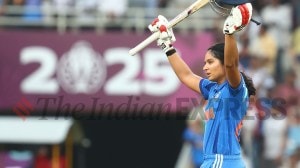Tricks of the trade
UNTIL a few months back,Avinashilingam University for Women in Coimbatore was known for little except the courses it offered. Suddenly.....
UNTIL a few months back,Avinashilingam University for Women in Coimbatore was known for little except the courses it offered. Suddenly,the university in Tamil Nadu finds itself at the peak of a health drink advertisement campaign,based on a research it conducted.
The autonomous institute,founded by Dr T S Avinashilingam under an education trust,was approached by Heinz India Private Limited in 2006 to conduct an 18-month-long feeding programme to ascertain the benefits of its health drink,Complan.
The control group was given Complan and their growth compared with children who were on a similar diet but did not consume Complan. We did find that children drinking Complan grew faster, said Dr Prema Kumari,head of the Department of Food Science and Nutrition,which conducted the research.
The university has conducted several studies in the past for sponsors including the Centre and state Government departments,UGC and the Pune-based Institute of Applied Research.
To conduct the independent study,the fast moving consumer goods (FMCG) company paid Rs 22.72 lakh to the university. Researchers justified the high cost pointing out that unlike usual studies that involved data collection from an existing group,the Complan study required having a core group under standard conditions that is,fed on a fixed diet for over a year.
The FMCG group used this study to justify premium pricing for the higher nutritional value the health drink offered. Waving the study at Horlicks,Complan claimed that children served Complan with a regular diet grow twice as fast compared to those on a regular diet,because Complan contains 100 per cent milk proteins and 23 vital nutrients.
Says a senior faculty at Avinashilingam University,We were approached by the company to do a study based on those who took the product and those who did not. We never compared it with any other product. We never wanted the controversy. It was all between two giants,we are not party to it.
In October 2008,Horlicks manufacturer GlaxoSmithKline (GSK) Consumer Healthcare launched its first comparative advertisement against Complan.
While Complan paid Avinashilingam University for their services,GSK entered into an agreement with National Institute of Nutrition (NIN) in Hyderabad,paying Rs 1.2 crore in six instalments to fund the study. The funds were used to buy bone density analysers,hire additional manpower,buy consumables for the whole team and pay honorarium to experts and analysts invited from time to time.
GSK maintains that the research citied in its advertisement was voluntary. The study was conducted voluntarily and independently to examine micronutrient deficiency in India among children. Malnutrition is the major cause of growth retardation and micronutrient deficiency. To address this issue,NIN conducted this study to test if a micronutrient fortified beverage could help in improving the micronutrient status in children, said the official spokesperson of GSK.
The study was conducted on a sample size of 869 children between the ages of 6-16 years for a period of 14 months. The main conclusions of the 14-month-long NIN study were that children who consumed a beverage enriched with micronutrients such as Vitamin A,iron,iodine,zinc,B-complex and calcium did not improve their intelligence quotient,memory,or school achievement but significantly improved their attention/ concentration span. A significant increase in height and weight in the recipient group was also noted.
NIN director Dr B Sesikeran says the study,conducted by 13 scientists and seven nutritionists,was double-blinded,which means that neither the subject nor the investigator knew whether the former was receiving the micronutrient-enriched supplement. This was essential to avoid any bias and to increase the precision of the outcome, Dr Sesikeran says. We also did not entertain any interference from GSKs nutritionist. We objected wherever we felt it was against our ethics and GSK did not press the matter further.
The NIN study was eventually published in the January 2006 edition of New York-based Nutrition-The International Journal of Applied and Basic Nutritional Sciences.
Soon after the first GSK ad,Heinz promptly put out a print ad to reinforce its superiority and also filed a case against GSK in the Bombay High Court. Besides moving court,Heinz put out another advertisement in response,saying that even though Complan had more nutritional contents,it was easier on the pocket.
The research-backed advertisement,however,snowballed into a full blown legal battle between the two companies in the Bombay and Delhi High Courts,eventually landing at the Supreme Court.
Expertspeak
THE current advertisement war between Complan and Horlicks has peaked after almost 10 years of competitive advertising. A recent advertisement shows two women with their sons shopping in a super market,one of them buying Complan and the other Horlicks. The one taking Complan picks up the Horlicks bottle from the others trolley and says,If you look at the ingredients in Horlicks,you will notice that they are very cheap items,and goes on to add that Complan is a complete health drink with the best ingredients.
Do the advertisements really validate the companies claims? It is a good thing that companies are conducting research before making tall claims in advertisements. But company-funded researches can hardly be taken at face value. The research has to be conducted at an independent institute where the results cannot be affected. Also,money changing hands is never a good idea because it is bound to affect the results, says Professor Bir Singh,community medicine,All India Institute of Medical Sciences (AIIMS).
While both companies are taking potshots at each other,experts maintain that both the products are making exaggerated claims. These drinks are dietary supplements and it has to be understood that they are just supplements. It means that children who eat non-vegetarian food and have a well-balanced diet do not require these drinks. Only the undernourished children,who are fussy eaters,require dietary supplements. Even in that case,the drink alone cannot make a child smarter or stronger or taller. They add flavour to milk,and parents usually want that because children refuse to drink plain milk, says Dr Parmeet Kaur,chief dietician,AIIMS.
Similarly,Dr Ritika Samaddar,chief dietician at Max Healthcare,adds if the calorie and protein requirement of a child is met by normal diet,health drinks are really not required. Forcing overweight children to have such drinks might actually not be in the best interest. If the child is not getting enough micronutrients,which are required by the body in very small quantities,then these drinks can help. But even in that case,it has to be understood that health drinks cannot single-handedly make anyone smart or strong. A healthy diet alone can do that, says Dr Samaddar.
Companies view
WHEN asked about the clash between the two FMCG groups,GSKCH said advertisements were only a way to help the consumer make an informed decision. The advertising campaign of a company keeps changing from time to time. The nature of the commercial can be comparative,competitive or generic,depending on a number of factors like the product,claim and market scenario. The objective of the Horlicks commercial was to highlight the benefits of the product and enable consumers to take an informed decision about the product, said a spokesperson for GSKCH.
Horlicks is the only health-food drink that has been scientifically proven to make kids taller,stronger,sharper. This claim is supported by the results of an extensive and robust clinical study, the spokesperson added.
Meanwhile,Heinz maintains that their two-times-faster claim has been validated and the advertisements are credible. In our advertisement,we just say twice as fast. The advertisement does not say twice as fast as which product. Technically,companies indulging in comparative advertisements can imply that the other product is inferior but they cannot say it explicitly. You can say that you are better but you cannot say the other product is worse,though both things are the same, says Anuradha Salhotra of Lall Lahiri & Salhotra,the law firm representing Heinz.
In the recent hearing at Delhi High Court,the petition was dismissed as the court maintained that the case was already underway in the Mumbai High Court and should continue there.
While the two companies fight it out,parents are busy figuring out whether their child requires a drink that makes him/her taller or smarter. Our guess is as good as yours.



- 01
- 02
- 03
- 04
- 05




























